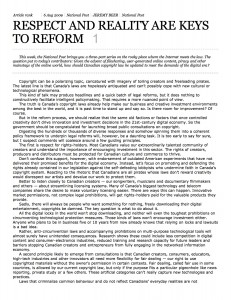My editorial in the National Post, “Respect and Reality are Keys to Reform,” reflects my comments at the government’s invitation-only copyright consultation prior to the most recent law reforms. You can listen to the full audio recording of the consultation here. Here’s my perspective as published in the Post:
Copyright can be a polarizing topic, caricatured with imagery of toiling creators and freeloading pirates. The latest line is that Canada’s laws are hopelessly antiquated and can’t possibly cope with new cultural or technological phenomena.
This kind of talk may produce headlines and a quick batch of legal reforms, but it does nothing to constructively facilitate intelligent policymaking. That requires a more nuanced point of view.
The truth is Canada’s copyright laws already help make our business and creative investment environments among the best in the world, and it is past time to stand up and say so. Is there room for improvement? Of course.

But in the reform process, we should realize that the same old factions or factors that once controlled creativity don’t drive innovation and investment decisions in the 21st-century digital economy. So the government should be congratulated for launching broad public consultations on copyright.
Digesting the hundreds or thousands of diverse responses and somehow spinning them into a coherent policy framework to underpin legal reforms will, however, be a daunting task. It is too early to say for sure, but I suspect comments will coalesce around a few guiding principles.
The first is respect for rights-holders. Most Canadians value our extraordinarily talented community of creators and understand the importance of encouraging investment in this sector. The rights of creators, producers and distributors must be protected for Canadian culture and commerce to thrive.
Don’t confuse this support, however, with endorsement of outdated American experiments that have not delivered their promised benefits for the digital economy. Instead, let’s focus on promoting and defending the rights already contained in our legislation against the self-defeating lobbyists who undermine faith in Canada’s copyright system. Reacting to the rhetoric that Canadians are all pirates whose laws don’t reward creativity would disrespect our artists and devalue our work to protect them.
Better to listen closely to Canadian creators – our songwriters, musicians and documentary filmmakers and others – about streamlining licensing systems. Many of Canada’s biggest technology and telecom companies share the desire to make voluntary licensing easier. There are ways this can happen. Innovative market permissions, not complex legal prohibitions, will get rights-holders paid for the valuable products they provide.
Sadly, there will always be people who want something for nothing, freely downloading their digital entertainment, copyrights be damned. The key question is what to do about it.
All the digital locks in the world won’t stop downloading, and neither will even the toughest prohibitions on circumventing technological protection measures. Those kinds of laws won’t encourage investment either. Anyone who plans to be in business five or 10 years from now already knows that relying on locks and lawsuits is a bad idea.
Rather, anti-circumvention laws and accompanying prohibitions on multi-purpose technological tools will almost surely have unintended consequences. Research shows these could include less competition in digital content and consumer-electronics industries, reduced training and research capacity for future leaders and barriers stopping Canadian creators and entrepreneurs from fully engaging in the networked information economy.
A second principle likely to emerge from consultations is that Canadian creators, consumers, educators, high-tech industries and other innovators all need more flexibility for fair dealing – our right to use copyrighted materials without the owner’s permission in certain contexts. Fair dealing, called fair use in some countries, is allowed by our current copyright law, but only if the purpose fits a particular pigeonhole like news reporting, private study or a few others. These artificial categories can’t really capture new technologies and practices.
Laws that criminalize common behaviour and do not reflect Canadians’ everyday realities are not sustainable. The only result will, unfortunately, be more public frustration around the very concept of copyright.
Canadian law currently suffers from this flaw, so reforms are needed. But the last attempt at legislation, Bill C61, wouldn’t have solved anything. Rather, it masked the symptoms with unbelievably bizarre provisions pertaining to things like videocassettes. These were outdated the moment they were drafted, and anyways would have been trumped by the aforementioned anti-circumvention provisions.
The most sustainable fix is a simple, technologically neutral approach that makes enumerated examples of fair dealing illustrative rather than exhaustive. Flexible fair dealing doesn’t mean total freewheeling. The Supreme Court has given us the guidelines for figuring out what’s fair and what isn’t. Stakeholder collaboration will lead to best practices, but only if the legal framework is flexible enough to accommodate reality.
There are other pressing matters, like performers’ rights, intermediary liability and statutory damages, that should also get attention. As with anti-circumvention and fair dealing, a balanced approach to these issues will benefit everyone by facilitating the cultural, technological and industrial innovations to power the Canadian economy for decades to come.